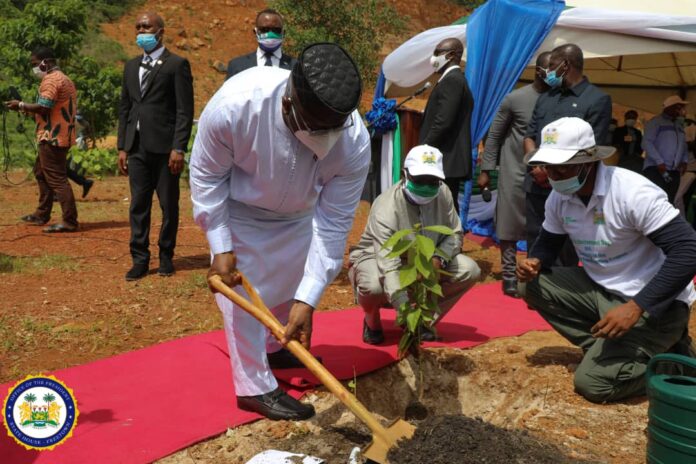By Lawrence Williams
Between 2021 and 2022, Sierra Leone’s Ministry of Environment and Climate Change implemented what it called Phase 2 of the National Tree Planting Project (NTPP). The project’s implementation was however marred with challenges and deviations from the approved plans, according to the 2022 annual Audit Report.
Initially, the Ministry decided to switch from using Service Providers (SPs) to using Community Forest Management Committees (CFMCs) for the planting process. However, without obtaining proper authority, the ministry went back to using SPs instead. This decision was made despite the National Public Procurement Authority (NPPA) not granting any objection to the change, the auditors said.
During a verification exercise, the audit team found several issues with the implementation of the project. Firstly, the delivery points for the seedlings were often far away from the plantation sites, making it difficult for the SPs to transport the seedlings effectively. As a result, some seedlings perished, the report noted.
Further, late delivery of seedlings by the supplier led to some service providers planting them at the wrong time, causing the seedlings to die back. Many of the sites visited lacked a constructed fire belt to protect the trees against future bushfires, and there was also no sustainability plan in place to ensure the long-term care of the planted trees after the expiration of the SPs’ contracts, the report stated.
Additionally, some sites visited showed signs of poor maintenance, with dense and bushy plants indicating that the SPs did not clean the sites or properly protect the seedlings. The audit team said it faced difficulties in verifying whether all the seedlings were actually planted, as some SPs were planted at segmented locations instead of the designated sites stated in the contracts.
The audit report made several recommendations, suggesting that the Procurement Committee should take responsibility for using the SPs approach instead of the approved CFMC. It also recommended that the ministry’s director of forestry ensures that SPs fulfil their responsibilities before making the final payment to them.
In its response to the queries, the ministry acknowledged the concerns raised and assured that the contract agreements will be strictly adhered to. It also provided documentation to support its decisions, such as the No Objection from the NPPA and the Certificate of Financial Approval from the Ministry of Finance.
Another issue highlighted in the report was the incomplete delivery of seedlings to the service providers. Despite the contracts stating that a total of 1,600,000 seedlings costing SLE16,000,000 should be delivered, the auditors found out that 166,408 seedlings costing SLE1,734,442 were not accounted for.
The ministry’s official response stated that all contracts were signed and available for inspection. It claimed that the delivery of seedlings was witnessed by officials of the ministry, although evidence of this was not submitted for verification.
Also, the audit report revealed that the ministry instructed commercial banks to release performance bonds to SPs even though the contracts were still ongoing. Delivery notes also indicated that not all service providers had received the required seedlings.
The auditors recommended that the procurement committee provides justification for returning the performance bond to SPs before the completion of the contracts. It also suggested that the committee obtains the performance securities from the SPs for the uncompleted contracts and submit them for audit inspection.
In response, the ministry stated that the service providers faced delays in receiving their advance payment, leading to pressure from the banks and requests for their performance bonds, adding that the procurement committee decided to set up assessment guidelines for the return of the advance payment guarantees to SPs who met the conditions. However, the report said the ministry did not provide evidence of returning the performance bond or submit them for audit inspection.




